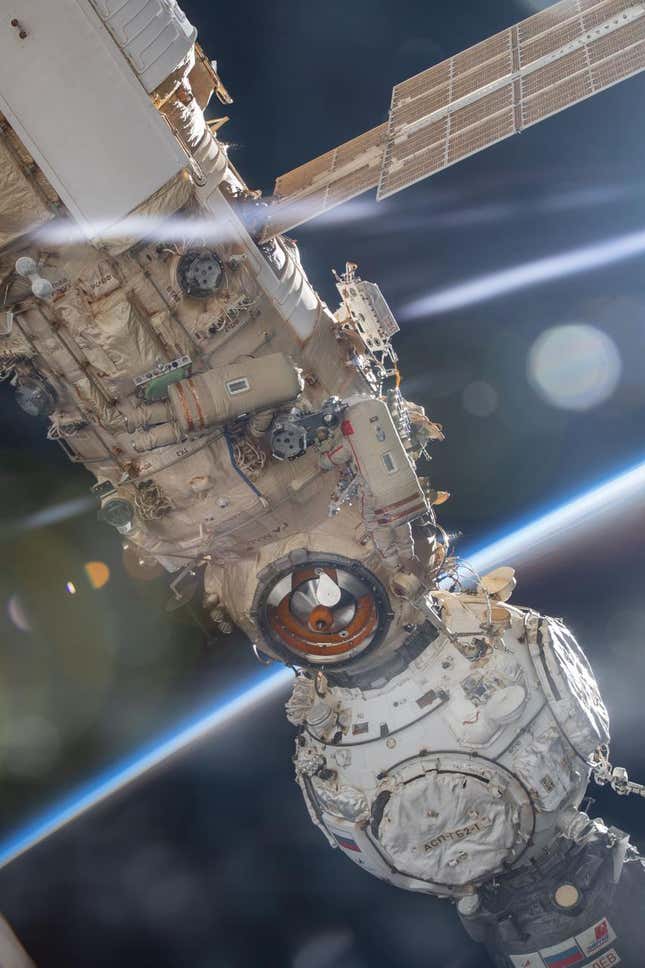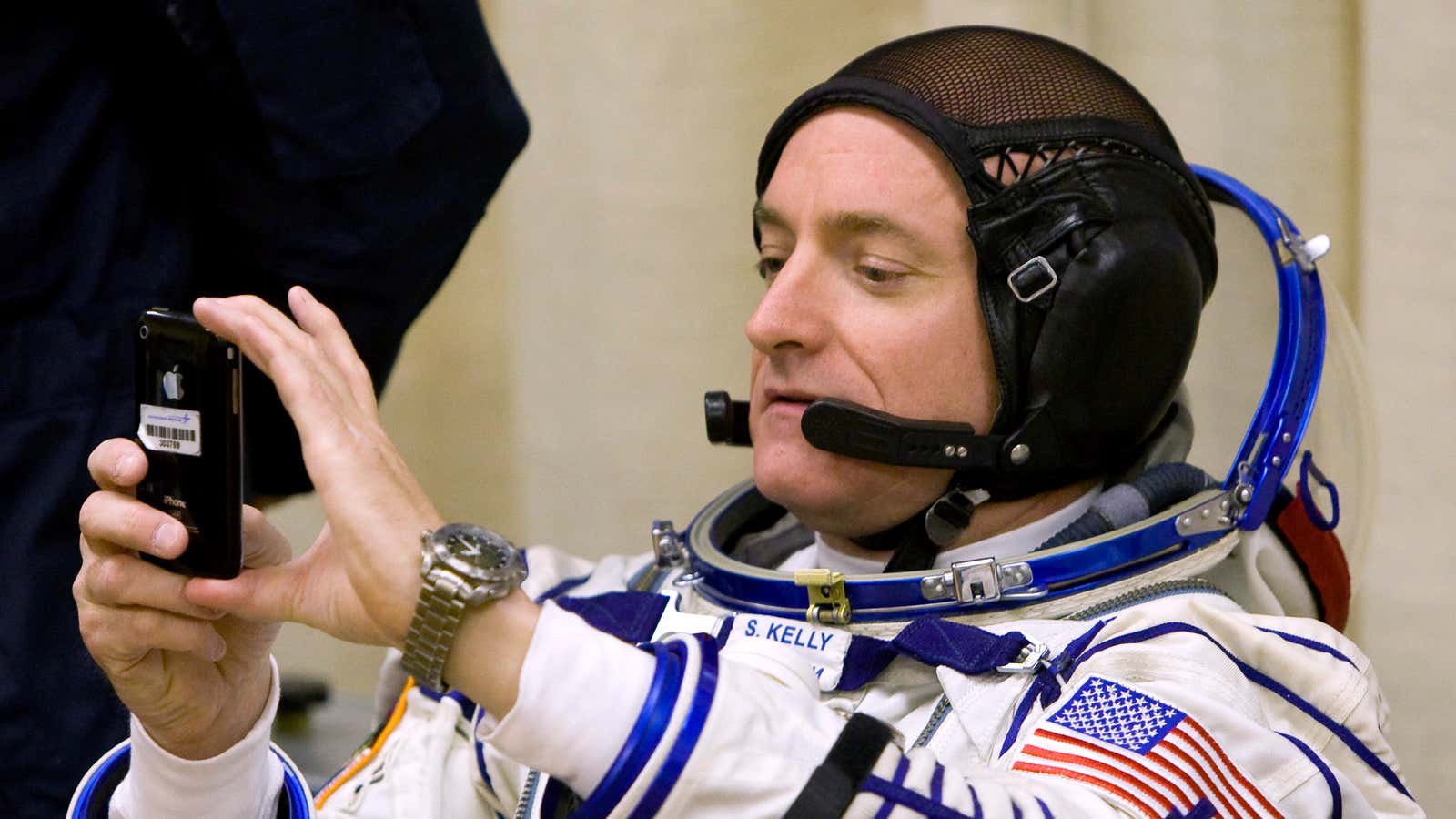Dear readers,
Welcome to Quartz’s newsletter on the economic possibilities of the extraterrestrial sphere. Please forward widely, and let me know what you think. This week: The most mysterious satellite customer, Boeing vs. Aerojet, and Russia hacks ViaSat.
🚀 🚀 🚀
The rumors are flying after satellite operator Globalstar coyly announced an agreement this week with “a large, global customer” to build out a new communications network, just months after announcing that an unidentified “potential customer” had put up more than $300 million to finance the purchase of 13 new satellites.
Analysts believe that the customer is a single entity. The scuttlebutt is that Apple is behind these deals, with the goal of using Globalstar to provide satellite connectivity to a future iPhone. Globalstar says it has been working with this customer since 2020 “in connection with the assessment of a potential service utilizing certain of our assets and capacity.”
Why Apple? In 2021, Bloomberg News cited anonymous sources to report that Apple was considering adding satellite-enabled communications to its mobile devices. And whoever the customer is, they have already paid some $430 million just in “assessment” of a potential service, so they must have deep pockets. That said, Globalstar has partnered with both Nokia and Qualcomm before, and both qualify as large, global customers.
Why Globalstar? This is a more interesting question. It’s not a very successful satellite company, losing more than $1.5 billion in the last decade, with its stock trading around $1 per share. Its main business is providing low-bandwidth telecom services, like text messages and data relays with internet of things devices. What it does have is a license to operate on a valuable chunk of spectrum.
Globalstar’s exclusive electromagnetic real estate is located near frequencies reserved for terrestrial uses. While past efforts to make money off this spectrum ran into regulatory roadblocks, it remains valuable, in theory. “Everybody in the space industry gets all googly-eyed over” it, says Caleb Henry, a senior analyst at Quilty Analytics, because it promises the ability to seamlessly link affordable mobile phones to both cell towers and satellites.
While most populated areas have reliable cell coverage, satellite connectivity could be useful in rural areas or while traveling. Satellite operators salivate at the chance of tapping into the much larger terrestrial communications market, and other companies, like AST SpaceMobile and Lynx, are working on their own plans to plug mobile phones into satellite networks.
Applications could be for emergency messages and location tracking, or for regular text messages, whenever a user goes beyond the reach of terrestrial networks. Based on Globalstar’s current satellite network, it’s unlikely that it could provide the bandwidth for phone calls immediately.
If the deal with the potential customer becomes an actual partnership with a top mobile device manufacturer like Apple, it would be a major comeback—and a surprising validation of the Globalstar’s true-believing chairman, Jay Monroe, who bought the company out of bankruptcy in 2004 and financed it through years of losses.
🌘 🌘 🌘
Imagery interlude
Two cosmonauts, Oleg Artemyev and Denis Matveev, donned space suits to activate a new robotic arm on the International Space Station in April.

🎧🎧🎧
You’re totally replaceable. Once upon a time, the specter of overpopulation loomed large in our collective consciousness. But Earth’s population growth actually peaked decades ago, and this century it could stop entirely. To understand how, you have to look at the “replacement rate.” Learn more with this week’s episode of the Quartz Obsession podcast.
Listen on: Apple Podcasts | Spotify | Google | Stitcher
🛰🛰🛰
SPACE DEBRIS
The fight over Boeing’s expensive valve failure. Reuters’ Joey Roulette reports on the conflict behind Boeing’s astronaut-carrying Starliner spacecraft, which has faced delays due to problems with valves in the propulsion system. Those valves are built by Aerojet, and the two firms are scrapping over which is responsible for their failure, with NASA apparently on Boeing’s side. The Starliner program has lost Boeing nearly $600 million so far, and it wants Aerojet to cover some of that cost, even as the US space agency awaits a final design.
The other scoop that caught everyone’s attention was reporting on a terrifying accident in 2017 that injured a Boeing subcontractor and led to the amputation of his leg. If you’re aware of a previously unreported safety issue at an aerospace company, don’t hesitate to get in touch and ask for my Signal number.
Russia hacks American-owned satellite. Researchers have confirmed that before Russia invaded Ukraine, its hackers broke into a communications satellite operated by the US company ViaSat and used by Ukraine’s military. The attack knocked out thousands of satellite terminals, but also thousands of wind turbines in Germany, underscoring the importance of satellite communications to global infrastructure.
Virgin Orbit plans UK launch. The Richard Branson-backed and SPAC’d company, which uses rockets launched from modified 747s to put satellites in orbit, is planning its first mission from the UK, with a payload from the National Reconnaissance Office, a US satellite intelligence agency. It will be the first private space launch in western Europe.
Is your Canoo sinking? The electric car company chosen by NASA to provide a vehicle for transporting Moon-bound astronauts to the launch pad said it was in danger of going out of business. The choice of Canoo was seen as a bit odd, given the company’s lack of a track record, but the vehicles won’t be needed until 2024 or so. NASA is trying to replace the “Astrovan” that served the Shuttle program with a more modern vehicle. For those keeping track of astronaut ground transport at home, SpaceX prefers Teslas, Blue Origin uses Amazon-backed Rivian vehicles, Virgin Galactic has Range Rovers (and time traveling bicycles), while Boeing is developing “Astrovan II.”
Worthwhile Canadian Initiative. Canada joined the US in adopting a ban on testing anti-satellite weapons that generate debris in orbit. Though Canada has never done so before, the announcement could help build consensus at the meeting of a UN-sponsored working group attempting to adopt new safety standards in orbit. Jessica West, who studies space security issues at Plougshares, an arms control group, has been tweeting the goings-on at the meeting, and reports the UK, France, Germany, the Republic of Korea, and Ireland expressed support for the ASAT ban without fully endorsing it.
your pal,
Tim
This was issue 132 of our newsletter. Hope your week is out of this world! Please send all your Globalstar rumors, unreported aerospace accidents, tips, and informed opinions to [email protected].
